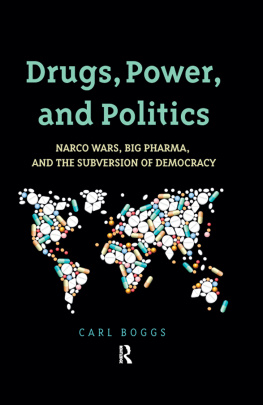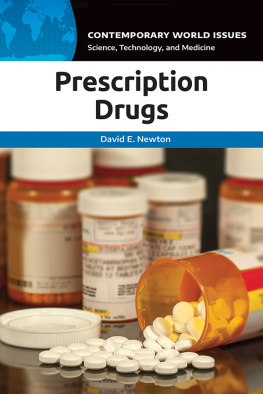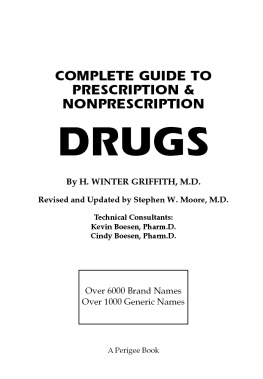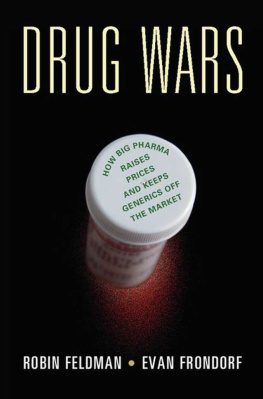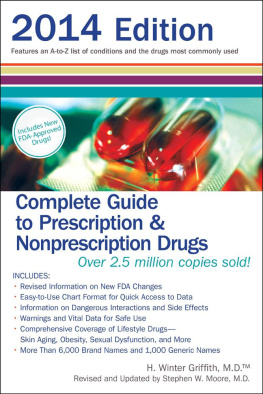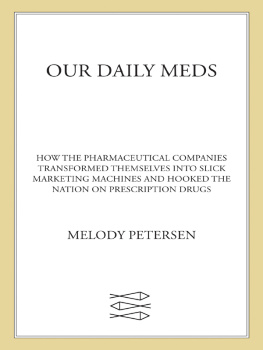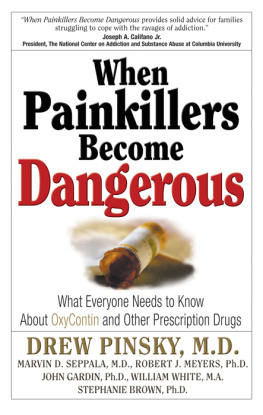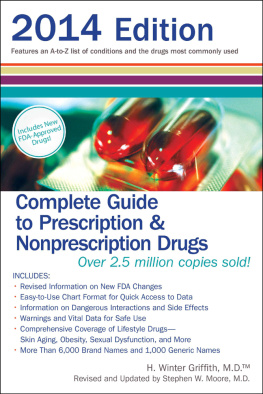A MARINER BOOK
HOUGHTON MIFFLIN COMPANY
BOSTON NEW YORK
FOR MY MOTHER, BETTY CRITSER
First Mariner Books edition 2006
Copyright 2005 by Greg Critser
ALL RIGHTS RESERVED
For information about permission to reproduce selections
from this book, write to Permissions, Houghton Mifflin Company,
215 Park Avenue South, New York, New York 10003.
Visit our Web site: www.houghtonmifflinbooks.com.
Library of Congress Cataloging-in-Publication Data
Critser, Greg.
Generation Rx : how prescription drugs are altering
American lives, minds, and bodies / Greg Critser.
p. ; cm.
Includes index.
ISBN -13: 978-0-618-39313-8 ISBN -10: 0-618-39313-7
1. Drug utilizationUnited States. 2. Pharmaceutical industryUnited
States. 3. DrugsSocial aspectsUnited States, [dnlm: 1. Drug Industry
economicsUnited StatesPopular Works. 1. Health Behavior
United StatesPopular Works. 3. Health PolicyUnited StatesPopular
Works. 4. Population GroupspsychologyUnited StatesPopular
Works, QV 736 C934g 2005] I. Title.
RM263.C75 2005 338.4'76151dc22 2005009113
ISBN -13: 978-0-618-77356-5 (pbk.)
ISBN -10: 0-618-77356-8 (pbk.)
Printed in the United States of America
Book design by Robert Overholtzer
QUM 10 9 8 7 6 5 4 3 2 1
Contents
Acknowledgments :
Introduction :
l. UNBOUND
The Strange and Very American Liberation of Big Pharma
2. WE LOVE IT!
How the New Pharma Used Its New Muscle to Create a New ... You
3. THE FULL PRICE
What Living in Pharma's World Means for Our Bodies
4. THE END OF THE GREAT BUFFER?
Why We Are More Vulnerable
5. INDEPENDENCE FOR GENERATION RX
What Can Be Done
A Brief Guide to the Art of Taking Prescription Drugs :
Notes :
Index :
Acknowledgments
Generation Rx is the product of a decade-long interest in the marketing of prescription drugs, and it has benefited greatly from the advice, wisdom, generosity, and courage of a number of individuals. Colin Harrison, my editor at Harper's, was the first to pay me to write about the subject; our wide-ranging discussions planted the invaluable seeds of the book more than thirteen years ago. Dan Ferrara, my editor at Worth, pushed my interest along by publishing a lengthy (and, for a business magazine, no-holds-barred) essay about my interviews with drug-company executives. That article also benefited from Dean Robinson's deft editing. At the Los Angeles Times, Sue Horton was a consistent, unyielding source of good editorial judgment, and she also bought me lunch. Thanks. At USA Today, Glenn Nishimura published several of my early op-ed pieces on the subject, and for that I am grateful too.
Generation Rx has also prospered from the insights of a number of unofficial advisers, mentors, and intellectual provocateurs. William Vodra, an attorney at Arnold and Porter, was an acute and generous industry observer who took the time to explain why things happened the way they did in the nation's capital. Al Engelberg, who litigated the first great generic drug cases, was similarly beneficent, patient, and thoughtful. Larry Sasich, at Public Citizen, provided a number of key interviews, his fair-minded assessments further proof that on any given day his and Sidney Wolfe's work on drug safety remains the ethical standard and the patient's best friend. John Kamp, at the law firm of Wiley Rein, was an outstanding tutor on media law and FDA regulation. In the sphere of medicine and pharmacological science, I was fortunate as well. Here my Virgil was UCLA's Dr. Barbara Levey, the past president of the American Society of Clinical Pharmacology and Therapeutics and a leading mover in the effort to get better science into the hands of prescribing physicians.
A book like this doesn't get far without the coddling, coaxing, tending, and care of two other critical players, an agent and an editor, and here again I find myself blessed. Richard Abate, at ICM, is a great agent, sagacious and literate. Deanne Urmy, my editor at Houghton Mifflin, was an unwavering source of support, wisdom, and advicewithout which the scale of the book would not have been possible. Also, she laughs at my jokes, and she knows how to ride a horse.
Any originality I brought to the subject was aided by a number of individuals, among whom were Ted C. Fishman, Daniel Fine-man, Barry Sanders, Mark Salzman, Joel Kotkin, Jeremy Newman, Steve Oney, Nancy Wadsworth, Catherine Seipp, Wolfgang Neuman, Robert Lerner, and Francine Kaufman. Ditto Jessica, Connie, and John Yu. Over the long term, the book and I benefited immeasurably from the counsel of James Stillwell, Robert Holmes, Robert Spear, Ben Weidenbener, and Ed Burke. The staff of UCLA's Louise M. Darling Biomedical Library were, as always, helpful, patient, and thoughtful, as were the staff at the National Archives in College Park, Maryland. During the actual writing and production of Generation Rx, Fiona Cole made footnoting (almost) fun, while the crew at Yoga House kept me in the psychic saddle. And then there was the great horseman Jeff Peters, who kept me in the literal one. Heels down!
In the realm of daily book writing, family truly matters the most.Generation Rx was deepened by my constant interaction with my mother-in-law, Julia Mongelli, and especially my father-in-law, Rocky Mongelli, who has, through his own harrowing adventures as a patient, made me see the questions that really count. My mother, Betty Critser, to whom this book is dedicated, was unflagging in her support for my writingsomething I could not get along without. My wife, Antoinette Mongelli, once again braved the endless waves of writerly self-absorption with grace and kindness, and she has given Generation Rx its heart.
Introduction
When a great profession and the forces of capitalism interact, drama is likely to result.
David Blumenthal, M.D.,
Massachusetts General Hospital
NOT LONG AGO, while reading through the pages of the New York Times, I came upon an article that really grabbed me, not because it was about some new horror abroad or another political debacle at home, but rather because it limned so cleanly the way American lives are changing. It was a story in the paper's "House and Home" section about the rise in popularity of "triple-wide" medicine cabinets. As the Times put it, "First there were French fries. Then there were sport utility vehicles. Now even the most private of domestic preserves, the medicine cabinet, has been supersized. With the sales of lotions, potions, 'nutraceuticals' and pharmaceuticals climbing to new heights, manufacturers are responding with medicine cabinets that are taller, wider and deeper than ever before."
The article included photographs of the classic bathroom cabinetthe tiny stained wall-hanger that most of us grew up withand a slew of the new breed: the "floor-to-ceiling," the "walk-in," the "super-deep and super-wide." There were cabinets with built-in defoggers and others hinged with fancy rubber gaskets so that they don't go "click" when one doesn't want them to go click. The designers' ingenuity was stunning, the new owners' justifications for their triple-wides quirky or peevish. ("He's obsessed with muscle power pills!" complained one woman of her husband's quest for more medicine chest space.) Everybody wanted bigger ones, better ones.
This book is about the products taking up an increasingly huge and expensive chunk of space in that American medicine chest: prescription drugs. Unlike potions and lotions for one's skin and hair, they are not products that we "decide" we want. Prescription drugs are products that highly educated people, whom we trust with our money and our lives, tell us that
Next page


